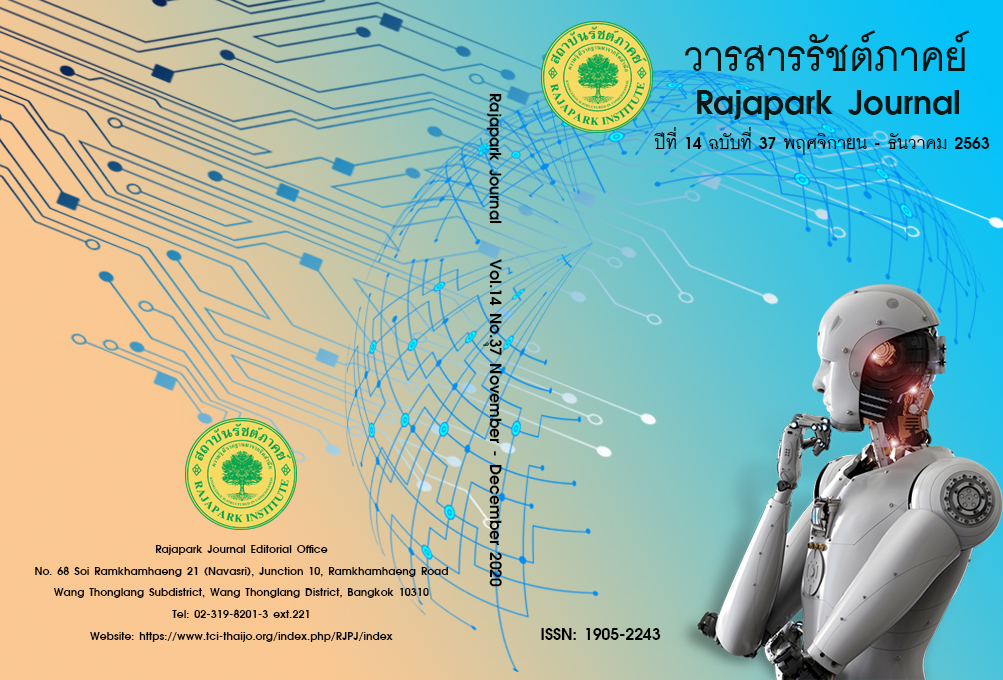Policy Formulation of Vocational Education in Bangkok
Main Article Content
Abstract
The objective of this study to study the context, problems, and obstacles, to propose effective and sustainable government policy formulation of vocational education policy Is qualitative research, collecting data from documents Theories and related literature Use the interview form to collect data. 27 key informants were directly involved, 6 government vocational education policies and 21 executives, presenting and analyzing descriptive data. The interview is reviewed by experts. The result of the research shows that (1) The context of vocational education policy setting in Bangkok Government vocational education policy 2012-2026 consists of 4 policies, 10 strategies, 28 strategies, and 93 projects. The policy principles of policy formulation for vocational education consists of 4 areas: 1) aiming to produce vocational manpower. 2) develop the quantity and quality of teachers, faculty, and personnel. Educational 3) School quality development and new learning sources. 4) Develop new management quality. (2) Problems and obstacles Found that the problem of discontinuation of the policy Images and values Standard course In terms of quality of schools, professors, and students. (3) Guidelines for policymaking must be clear and every department that supervises creates good values and image. Arrange the curriculum by the labor market the government should set appropriate compensation.
Article Details
Views and opinions appearing in the Journal it is the responsibility of the author of the article, and does not constitute the view and responsibility of the editorial team.
References
Jamderm, A. (2013). The Marketing Strategies of Private Vocational Schools in Thailand. EAU Heritage Journal Social Science and Humanities, 3(2), 114-124.
Office of the Education Council. (2011). Education Development Strategy to Build Citizenship 2010 – 2018. Office of the Education Council. Ministry of Education.
Office of the National Education Commission. (2004). Reports on the development of an internal quality assurance system in schools. Bangkok: Office of the National Education Commission.
Office of the Permanent Secretary Ministry of Education. (2016). Annual government action plan for the fiscal year 2016. Bureau of Policy and Strategy: Office of the Permanent Secretary Ministry of Education.
Office of the Public Sector Development Commission (OPDC). (2013). Strategic Plan for Development of the Thai Bureaucracy (2013-2018). Bangkok: Office of the Public Sector Development Commission (OPDC).
Preewan, P., Baongern, C., & Wongsirasawat, C. (2016). Causal Relationship Model of Factors Affecting Dual Vocational Training Development. Journal of Graduate Studies Valaya Alongkron Rajabhat University, 10(2), 201-214.
Sainui, P., Sathapornwachana, S., & Intarak, P. (2015). Thailand’s Educational Policy Formulation in Next Decade. Academic Journals Phranakhon Rajabhat University, 5(1), 108-117.
Samkoset, W. (2014, January 24). When the Ministry of Education changed the ministers often 16 years 15 people. Retrieved April 20, 2016, from https://thaipublica.org/2014/01/the-performance-period-of-the-minister-of-education/
Tangjuang, P., & Rupavijetra, P. (2007). The development of manpower potential in vocational institutions and institutions. Chiang Mai: Faculty of Education, Chiang Mai University.
Thaireform. (2016, February 19). Gen. Dawpong Ratanasuwan: The Golden Year of Vocational Merger of Public-private Educational Institutions. Retrieved April 20, 2016, from https://www.isranews.org/thaireform-other-news/44944-edu_44944.html


